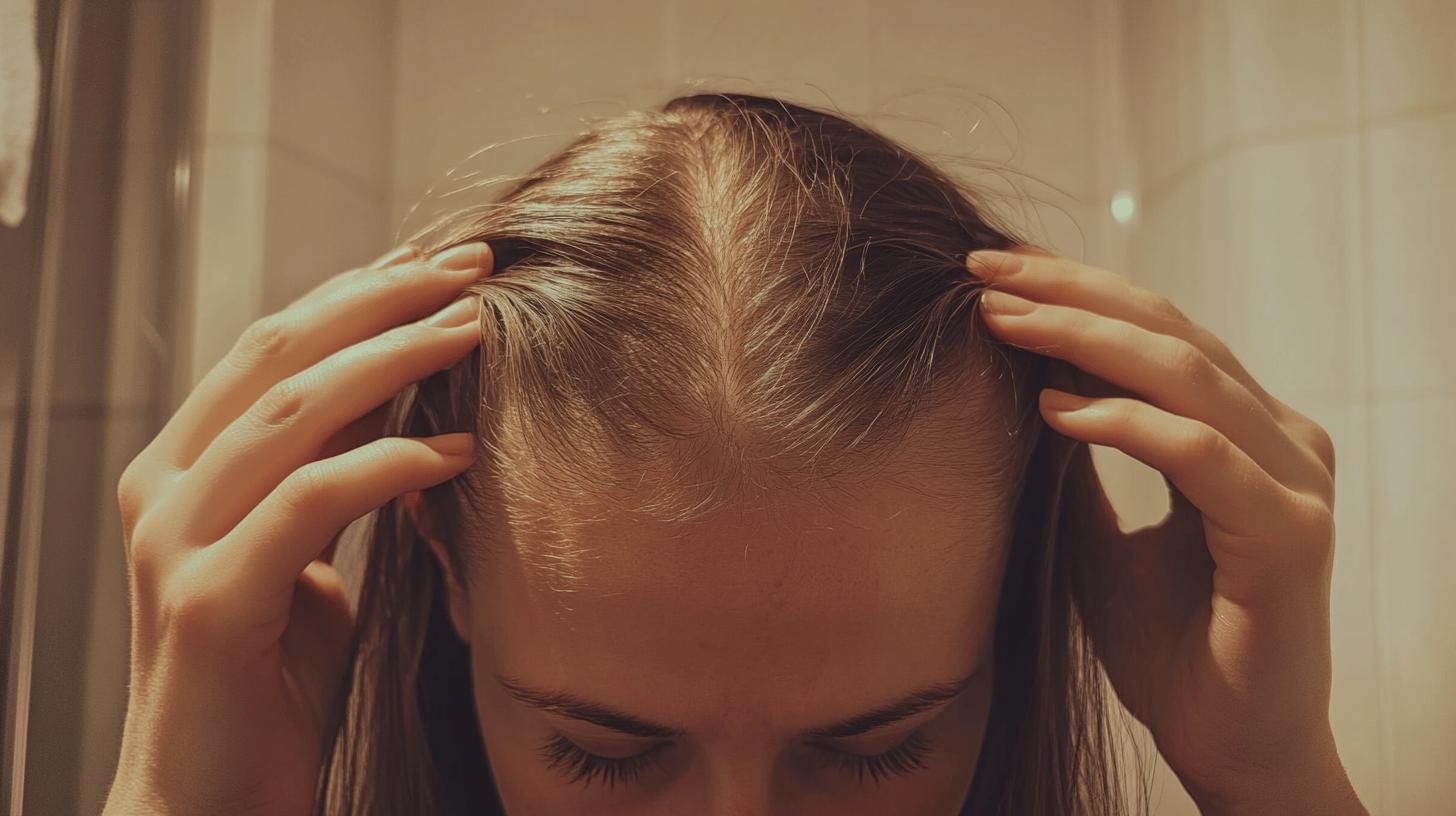TL;DR:
- Autoimmune diseases, affecting 23.5 million Americans, can cause hair loss by attacking hair follicles.
- Notable conditions include:
- Alopecia Areata: Affects ~2% of people; sudden patchy hair loss.
- Lupus: Causes inflammation leading to fragile, thinning hair.
- Thyroid Disorders (e.g., Hashimoto’s): Hormonal imbalances disrupt hair health.
- Psoriasis & Rheumatoid Arthritis: Cause inflammation and hair loss, worsened by treatments.
- Diagnostic tests: ANA test, thyroid panel, CRP test, scalp biopsy.
- Treatment options include corticosteroids, immunosuppressants, and topical solutions.
- Preventive measures: Balanced diet, stress-reduction techniques, and regular check-ups.
I’m sure this thought, ‘Can autoimmune diseases cause hair loss?’ locks in your mind as you wonder if your immune system is playing tug-of-war with your hair. It’s true—autoimmune diseases, those sneaky chronic conditions, can actually target your luscious locks. With over 23.5 million Americans dealing with these often misunderstood disorders, hair loss is more common than you might think. In this post, we will uncover how these diseases cause hair fallout and spotlight alopecia areata as a prime example. Ready to untangle the mysteries of autoimmune hair loss? Let’s find out what’s really going on up there!
Understanding How Autoimmune Diseases Cause Hair Loss
Autoimmune diseases occur when our immune system, which is meant to protect us, mistakenly attacks our own body. About 23.5 million Americans are affected with over 80 chronic conditions in this category. But what about hair? These diseases often target hair follicles, leading to hair loss.
Alopecia areata is a key example. It affects about 2% of people, attacking hair follicles so suddenly that your hair disappears in patches. The immune system identifies hair follicles as enemies, leading to random or extensive hair loss.
But that’s not all! Other autoimmune diseases also contribute to hair loss. Lupus, for example, causes skin and hairline inflammation. Thyroid disorders, like Hashimoto’s, create hormone imbalances affecting hair health. Even psoriasis and rheumatoid arthritis can lead to hair loss, not only from the disease itself but also due to medications used for treatment.
Symptoms of autoimmune-related hair loss include:
- Sudden patchy hair loss
- Thinning hair
- Fragile hair along the hairline
- Loss of body hair (eyebrows, eyelashes)
- Itchy or inflamed scalp
Notice these signs? It might mean your immune system is causing trouble.
Autoimmune Diseases Linked to Hair Loss

Certain autoimmune disorders are notorious for causing hair loss. Lupus, thyroid disorders, psoriasis, and rheumatoid arthritis can lead to thinning hair. Each condition affects the body differently but harms hair health due to inflammation or hormone imbalance.
Lupus
Lupus causes inflammation, which weakens hair. It can make hair fragile and thin around the hairline. If you notice thinning hair with lupus, inflammation is likely the cause.
Thyroid Disorders
Thyroid disorders like Hashimoto’s and Graves’s disease disrupt hormones vital for healthy hair when these hormones are imbalanced, hair thinning or shedding often follows, disrupting the normal growth cycle.
Psoriasis and Rheumatoid Arthritis
Both cause inflammation and can lead to hair loss. Unfortunately, treatments for these conditions might worsen hair loss. It’s essential to manage symptoms effectively to prevent unwanted changes to your hair.
Diagnosing and Treating Autoimmune-Related Hair Loss
How can you tell if hair loss is due to an autoimmune disease? The process usually starts with a dermatologist examining the problem. Tests like the ANA test for lupus, thyroid panels, and CRP tests help pinpoint causes. These tests fit the puzzle pieces together to uncover why hair loss occurs.
Treatment varies based on the condition. Medications like corticosteroids may calm the immune system. Immunosuppressants or JAK inhibitors might be used in persistent cases. Topical solutions could also promote regrowth. It’s about finding what works best for your hair.
Common diagnostic tests for autoimmune-related hair loss include:
- ANA test for lupus
- Thyroid panel
- CRP test for inflammation
- Scalp biopsy for detailed examination
If unexplained hair loss is troubling you, these tests might help solve the mystery.
Preventive Measures and Lifestyle Changes for Managing Hair Loss

Nutrition helps to combat hair loss from alopecia areata. Vitamins and minerals like biotin, zinc, and vitamin D support hair health. Including these in your diet strengthens hair follicles.
Stress can affect hair, too. Techniques like meditation, yoga, and breathing exercises manage stress. It’s like giving your hair a peaceful environment to thrive.
Don’t skip regular check-ups! These are crucial for detecting health issues affecting hair. Early intervention can manage symptoms and prevent further hair loss.
- Eat a balanced diet rich in vitamins and minerals
- Practice stress-reduction techniques like meditation
- Schedule regular medical check-ups to catch issues early
The Role of Direct Primary Care in Managing Hair Loss
Can direct primary care (DPC) aid hair loss due to autoimmune diseases? Yes! DPC offers affordable, personalized care without insurance hassles. It’s focused on continuous care and preventive practices, emphasizing your health over paperwork.
DPC fosters strong patient-doctor relationships, which is vital for addressing hair loss linked to autoimmune conditions. This approach helps with diseases like alopecia or lupus, focusing on ongoing care and tailored treatments. It’s like having a personal health coach guiding you toward healthier hair.
|Benefit|Explanation|
|—|—|
|Personalized Care|Tailored treatment plans for individual needs|
|Continuous Monitoring|Regular check-ups to manage chronic conditions|
|No Insurance Hassles|Direct relationship with your doctor, free from insurance constraints|
Final Words
Indeed, autoimmune diseases like lupus, thyroid disorders, and alopecia areata can cause hair loss. We dove into the mechanics of how the immune system turns against hair follicles, leaving many struggling with thinning hair. We explored the available options, from diagnosing with lab tests to treating with medications like corticosteroids.
Direct primary care offers a personalized, continuous approach to managing autoimmune hair loss. It’s all about eliminating barriers and focusing on your well-being. If hair loss from autoimmune diseases has been a challenge, know that understanding and managing it is absolutely possible. Stay positive and proactive!
FAQ
How to stop hair loss from autoimmune diseases?
Stopping autoimmune hair loss involves managing the underlying condition. Common treatments include medications like corticosteroids and immunosuppressants, nutritional support, and stress management. Regular check-ups with your healthcare provider can also help.
Female hair loss autoimmune disease causes?
In females, autoimmune diseases like lupus and alopecia areata often attack hair follicles, causing hair loss. Hormonal imbalance from thyroid disorders can also contribute. Lifestyle changes and medication can help manage these causes.
Alopecia areata causes?
Alopecia areata is caused by the immune system mistakenly attacking hair follicles, leading to hair loss. Stress and genetics may also play roles in triggering or worsening the condition.
Can autoimmune hair loss grow back?
With proper treatment and management, autoimmune-related hair loss can often be reversed, allowing hair to regrow. Treatments vary by individual, but options include medications and lifestyle adjustments.
What are 5 common symptoms of an autoimmune disorder?
Common symptoms include fatigue, joint pain, skin rashes, fevers, and hair loss. These symptoms can vary widely depending on the specific autoimmune disease involved.
How can I stop my autoimmune system from killing my hair?
Stopping your immune system from attacking hair involves treatments targeting the immune response. Options include corticosteroids, immunosuppressants, and lifestyle modifications, like stress management and a healthy diet.
What autoimmune disease causes hair loss and joint pain?
Lupus and rheumatoid arthritis are known to cause both hair loss and joint pain due to inflammation. Treatments focus on reducing inflammation and managing symptoms comprehensively.
How to stop alopecia areata from spreading?
To prevent alopecia areata from spreading, early intervention with treatment options like topical steroids and stress reduction is key. Consult your dermatologist for a tailored treatment plan.
What illnesses cause hair loss in females?
Hair loss in females can be caused by lupus, thyroid disorders, and alopecia areata. Nutritional deficiencies and hormonal changes are also common culprits that affect hair health.
Things to avoid when you have alopecia areata?
When managing alopecia areata, avoid high-stress environments, hair products that irritate your scalp, and nutritional deficiencies. Maintaining a balanced diet and a relaxing lifestyle can help manage symptoms.

